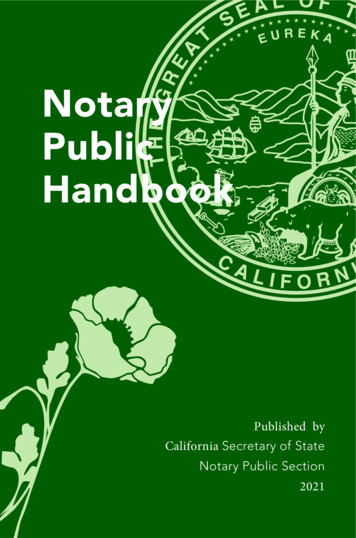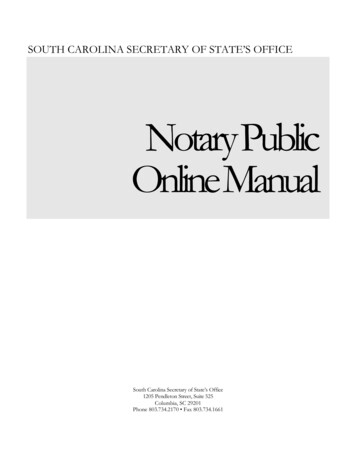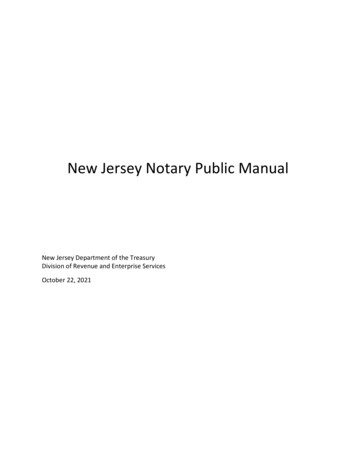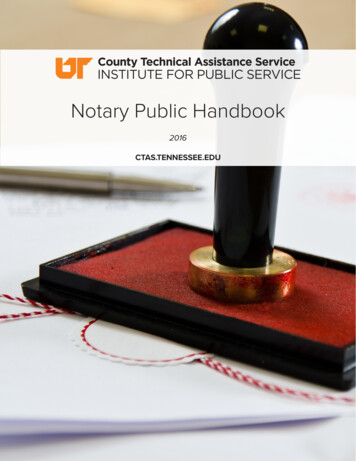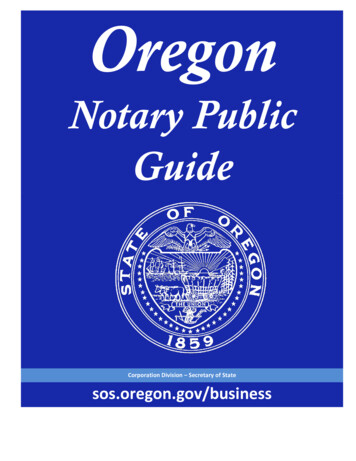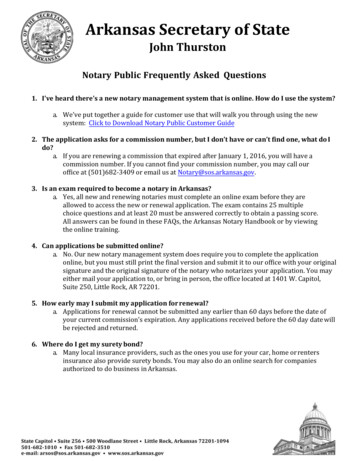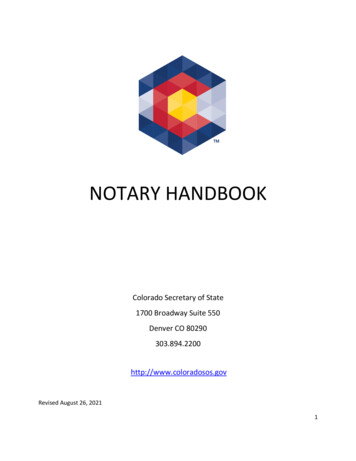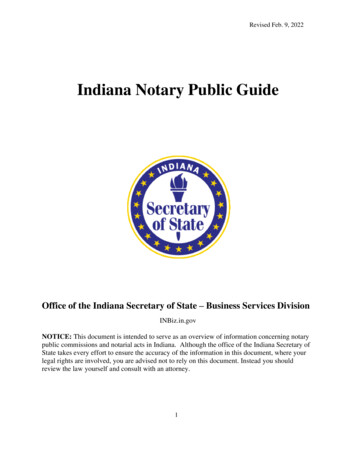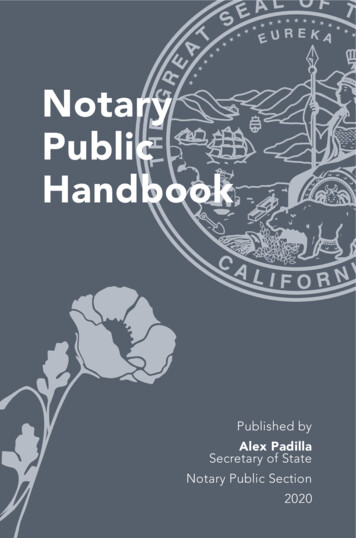
Transcription
NOTARY PUBLIC MANUALSTATE OF HAWAI‘IDepartment of the Attorney GeneralNotary Public Program425 Queen StreetHonolulu, Hawai‘i 96813Website: http://ag.hawaii.gov/notaries-public/E-mail: ATG.notary@hawaii.govPh. (808) 586-1216NOT FOR RESALERevised January 2016i
Table of ContentsPageIntroductionI. GENERAL INFORMATIONQualifications . Application .Appointment and Tenure Rules Notarial Seal Official Signature Filing Copy of Commission;Authentication of Acts . .Official Bond . .Liabilities; Limitations on; Official Bond .Notarial Record Book; Specifications;Copies as Evidence .Disposition of Notarial Record Books andPenalties Notaries in Government Service . II. DUTIES AND LIABILITIESDefinition . .Why Documents Are Notarized . .Duties . Obligations and Limitations . .Persons Who Are Unable To Sign .Civil and Criminal Liability i111112222333444566
Table of ContentsPageIII. POWERS AND FUNCTIONSJurisdiction . .Date of Notarial Act Changes on Document Administering an Oath or Affidavit Taking an Acknowledgment .Notary Certificate .Fees Notaries May Charge . . Fees Charged To Notaries . .Notaries Public Revolving Fund. . .88881012131414Disclaimer . .15Act 175 Relating to Fraud Prevention . .16ii
IntroductionA Notary Public is a public officer whose functions include:(1)(2)(3)(4)(5)administering oaths;witnessing the signing of documents;attesting to the identity of the signers of the document;noting protests; andtaking acknowledgments of documents.Although a notary public may be commissioned to perform services in connection with workfor his/her employer, the notary is nonetheless a public officer and as such is required toprovide notarial service to the general public.A government notary whose fees and bond are waived, however, is limited by law toperforming notarial services pertaining to the business of the government, except where theoccasion is deemed by the head of the department of the governmental unit to be one of urgentnecessity and convenience.iii
I. GENERAL INFORMATIONQualificationsIn Hawaii, to be eligible for a notary public commission, the applicant must be:1. A United States citizen, or a national or permanent resident alien of the U.S. who diligently seekscitizenship upon becoming eligible to apply for U.S. citizenship;2. A Hawaii resident; and3. At least 18 years old.ApplicationApplication for a notary public commission is made on forms provided by the Attorney General.You may download an application from the Notary Program’s website: http://ag.hawaii.gov/notariespublic/.After approval of an applicant by the Attorney General, the applicant is required to take a writtenclosed-book examination covering the statutory laws and administrative rules that apply to notaries public,as well as practical aspects of a notary’s practice, and a notary’s duties and responsibilities. The passingscore is 80 percent.Appointment and TenureThe Attorney General may, in the Attorney General’s discretion, appoint and commission suchnumber of notaries public for the State as the Attorney General deems necessary for the public good andconvenience. The term of office of a notary public shall be four years from the date of the notary’scommission, unless sooner removed by the Attorney General for cause after due hearing; provided thatafter due hearing the commission of a notary public may be revoked or otherwise disciplined by theAttorney General in any case where any change occurs in the notary’s office, occupation, residence, oremployment which in the Attorney General’s judgment renders the holding of such commission by thenotary no longer necessary for the public good and convenience. Each notary shall, upon any change in thenotary’s office, occupation, residence, or employment, report the same in writing to the Attorney Generalwithin thirty days of the change.Each notary public shall be responsible for renewing the notary public’s commission on a timelybasis and satisfying the renewal requirements provided by law. The failure to renew a commission in atimely manner may cause the commission to be forfeited, if the Attorney General finds that the failure wasdone knowingly. The commission of a notary public is forfeited if the notary public knowingly fails tosubmit a completed renewal application, pay the renewal fee, or complete the processing and filing of acommission for renewal by the date of expiration of the notary public’s commission. A failure to renewshall be deemed knowingly if notice of renewal is sent to the last address on file for the notary public andthe notary public fails to complete all these requirements. Any notary seeking to restore the notary’sforfeited commission more than one year from the date of expiration of the commission shall reapply as anew applicant for a notary public commission.RulesThe Attorney General, subject to chapter 91, Hawaii Revised Statutes (HRS), may prescribe suchrules as the Attorney General deems advisable concerning the administration of chapter 456, HRS, theappointment and duties of notaries public, and the duties of other officers thereunder. The rules shallhave the force and effect of law. Chapter 5-11, Hawaii Administrative Rules (HAR), the rules governing thepractices and procedures of notaries commissioned in Hawaii, was adopted on May 5, 2008.Notarial SealEach notary is required to obtain, at the expense of the notary or the notary’s company, and shallconstantly keep either an engraved seal of office or a rubber stamp facsimile seal which shall be circular,not over two inches in diameter, with a serrated or milled edge border and clearly show, when embossed,-1-
stamped, or impressed upon a document, the notary’s name and commission number, and the words“notary public” and “State of Hawaii”. The notary public shall authenticate all the notary’s official acts,attestations, certificates, and instruments therewith, and shall always add to an official signature the typedor printed name of the notary and a statement showing the date that the notary’s commission expires.Upon resignation, death, expiration of term of office without reappointment, or removal from orabandonment of office, the notary public shall immediately deliver the notary’s seal to the AttorneyGeneral for defacement or destruction. If any notary fails to deliver the seal within ninety days of the dateof the notary’s resignation, expiration of term of office without reappointment, or removal from orabandonment of office, or if the notary’s personal representative fails to comply within ninety days of thenotary’s death, then the notary public or the notary’s personal representative shall forfeit to the State notmore than 200, in the discretion of the court, to be recovered in an action to be brought by the AttorneyGeneral on behalf of the State.Official SignatureA notary must sign the notary’s official signature in the same manner as it appears on the notary’sseal. For example, if the notary’s name is “John Doe” on the notary’s seal, he signs in the same form, i.e.,“John Doe” and not “J. Doe”. A notary must always add to the notary’s official signature the date ofexpiration of the notary’s commission as a notary public and a typed or legibly printed name of the notarybelow the notary’s signature.Filing Copy of Commission;Authentication of ActsEvery notary, after being commissioned, must forthwith file a photocopy of the notary’scommission, an impression of the notary’s seal, and a specimen of the notary’s official signature with theclerk of the circuit court of the circuit in which the notary resides. Each notary may also file these samedocuments with the clerk of any other circuit court. Thereafter, any clerk, when requested, shall certify tothe official character and acts of any such notary whose commission, impression of seal, and specimen ofofficial signature are on file with the clerk’s office (a process called authentication). (Authentication isusually required when a document notarized by a local notary public is sent to another state or country.Such state or country may require evidence that the notary who notarized the document is a dulycommissioned officer of the State of Hawaii.) Authentication is also done by the Office of the LieutenantGovernor.Official BondEach notary public forthwith and before entering upon the duties of the notary’s office shallexecute, at the expense of the notary or the notary’s company, an official surety bond which shall be in thesum of 1,000. Each bond shall be approved by a judge of the circuit court of the circuit in which thenotary resides.The obligee of each bond shall be the State and the condition contained therein shall be that thenotary public will well, truly, and faithfully perform all the duties of the notary’s office which are then ormay thereafter be required, prescribed, or defined by law or by any rule made under the express or impliedauthority of any statute, and all duties and acts undertaken, assumed, or performed by the notary public byvirtue or color of the notary’s office. The surety on any such bond shall be a surety company authorized todo business in the State. After approval, the bond shall be deposited and kept on file in the office of theclerk of the circuit court of the circuit in which the notary public resides. The clerk shall keep a book to becalled the “bond record”, in which the clerk shall record such data in respect to each of the bondsdeposited and filed in the clerk’s office as the Attorney General may direct.Liabilities; Limitations on; Official BondIn the performance of a notarial act, a notary’s liability shall be limited to a failure by the notary toperform properly the actions required for the jurat, acknowledgment, or other notarial act.For the official misconduct or neglect of a notary public or breach of any of the conditions of thenotary’s official bond, the notary and the surety on the notary’s official bond shall be liable to the party-2-
injured thereby for all the damages sustained. The party shall have a right of action in the party’s ownname upon the bond and may prosecute the action to final judgment and execution.Notarial Record Book; Specifications; Copies as EvidenceEvery notary public shall record at length in a book of records all acts, protests, depositions, andother things, by the notary noted or done in the notary’s official capacity. For each official act, the notaryshall enter in the book:1.The type, date, and time of day of the notarial act;2.The title or type and date of the document or proceeding;3.The signature, printed name, and address of each person whose signature is notarized andof each witness;4.Other parties to the instrument; and5.The manner in which the signer was identified.All copies or certificates granted by the notary shall be under the notary’s hand and notarial seal,and shall be received as evidence of such transactions.The record book shall be bound with a soft cover and shall not exceed eleven inches in height andsixteen and one-half inches in width when fully opened. The pages of the record book shall beconsecutively numbered. The notary public shall always provide and print legibly on the information pageof each record book the notary public’s name, business address, commission number, and commissionexpiration date, the book number, and the beginning and ending dates of the notarial acts recorded in thatbook. The notary public shall always print legibly the notary public’s name on the top left corner and thenotary public’s commission number on the top right corner of each set of pages of transactions in eachrecord book.Disposition of Notarial Record Books and PenaltiesThe records of each notary public shall be deposited with the Attorney General upon theresignation, death, expiration of each term of office, or removal from or abandonment of office. If anynotary fails to comply within ninety days of the date of the resignation, expiration of any term of office, orremoval from or abandonment of office, or if the notary’s personal representative fails to comply withinninety days of the notary’s death, then the notary or the notary’s personal representative shall forfeit to theState not less than 50 nor more than 500, in the discretion of the court, in an action brought by theAttorney General on behalf of the State.Notaries in Government ServiceExcept as otherwise provided for by law, the head of every department (which, as used in HRSChapter 456, includes any department, board, commission, bureau, or establishment of the United States,or of the State, or any political subdivision thereof) may designate one or more subordinates to be a notarypublic who, upon duly qualifying and receiving a commission as a notary public in government service,shall perform, without charge, the services of a notary public in all matters of business pertaining to theState, any political subdivision thereof, or the United States.Any provision of this chapter to the contrary notwithstanding, a subordinate so designated andqualified and commissioned as a notary public in government service shall:1.Be authorized to perform the duties of a notary public in one or more of the judicial circuitsof the State as the Attorney General shall designate;2.Not be required to:-3-
A.B.C.3.Pay any fee to the clerk of any circuit court for filing a copy of the notary’scommission;Pay any fee to the Attorney General for the issuance of the notary’s commission orthe renewal thereof; orFurnish and file an official bond unless that bond is required by the head of thedepartment in which the notary is a subordinate, in which event, the expense offurnishing any such bond shall be borne by the department concerned; andNot demand or receive any fee for the notary’s service as a notary public; provided thatwhere the occasion, in the judgment of the head of the department, is deemed one of urgentnecessity and convenience, the notary may, but shall not be compelled to, administer oathsor take acknowledgments in nongovernmental matters, for which services the prescribedfees shall be demanded and received as governmental realizations and deposited into thenotaries public revolving fund established by HRS § 456-9.5, except that if that fund isterminated, the fees shall be deposited into the general fund of the State; provided furtherthat with the prior written approval of the Attorney General, the notary public, upon payingthe fees prescribed by law and upon executing, depositing, and filing at the notary’s ownexpense, the required official bond, may demand or receive the fees prescribed by law forservices rendered by the notary in matters not pertaining to such government business.II. DUTIES AND LIABILITIESDefinitionA notary is defined as a “public officer whose function is to attest and certify, by the notary’s handand official seal, certain classes of documents, in order to give them credit and authenticity in foreignjurisdictions, to take acknowledgments of deeds and other conveyances, and certify them, and to performcertain official acts, chiefly in commercial matters.” 66 C.J.S. Notaries § 2.Why Documents Are NotarizedA document is notarized in order to protect persons signing an important document. It assures theparties to an agreement that this particular document and no other is the authentic document which isintended to be given full force and effect. Because of the recent improvements in photocopying machines,it is important that certain documents be notarized and notarized properly--otherwise any imposter couldforge a signature and substitute an authentic document with an illegally altered and fraudulent document.In addition, the recent adoption of HAR Chapter 5-11 helps prevent the fraudulent use of notarizeddocuments and seals. Specifically, HAR § 5-11-8 requires a notary to evidence every acknowledgment orjurat with a certificate describing the document and is intended to prevent a page with an acknowledgmentor a jurat from being detached from its original document and then “switched” or reattached to anotherdocument for fraudulent purposes. HAR § 5-11-8 specifies that the notary list the number of pages of eachnotarized document and provide an identification or description of the notarized document “in closeproximity” to the acknowledgment or jurat.Duties“A notary must perform the notary’s official duties with integrity, diligence, and skill. The notary’sduty is not confined to the one to whom the notary directly renders service, but it extends to all personswho may be affected by the notary’s act.” 66 C.J.S. Notaries § 17. The powers and duties vested in thenotary are personal to the notary and should never be delegated. In other words, a notary should not allowa clerk or deputy to perform a notarial act for the notary.Under Hawaii law, the duties of a notary public are generally confined to performing the followingnotarial acts:1. Taking an acknowledgment -- “An acknowledgment is a public declaration or formal statement ofthe person executing (signing) an instrument made to the official authorized to take the acknowledgment,that the execution of such instrument was his or her free act and deed. The written evidence of anacknowledgment is the certificate of the officer who takes the acknowledgment, which states in substance-4-
that the person named in the acknowledgment was known to and appeared before the officer andacknowledged the instrument to be the person’s act and deed.”1 Am.Jur. Legal Forms 2dAcknowledgments § 7:1.2. Administering an oath, affirmation, or affidavit -- An oath is “a solemn pledge or promise madeby a person (often called the affiant) with an appeal to God, or a Supreme Being, to attest to the truth of theperson’s words.” Rotham, Notary Public Practices & Glossary (1978), at p. 24. An affirmation is “a solemnstatement or declaration made as a substitute for a sworn statement by a person whose conscience will notpermit the person to swear at all.” 18C Am.Jur. Pleadings and Practice Forms, Oath and Affirmation § 1.An affidavit is “a written or printed statement of facts, made voluntarily, and under oath or affirmation ofthe party making it, taken before an officer having authority to administer such oath.” Black’s LawDictionary (Rev. 6th Ed.), at p. 58.3. Taking a deposition –- “The term ‘deposition’ is sometimes used in a broad sense to describe anywritten statement verified by oath; but in its more technical and appropriate sense, the meaning of theword is limited to the written testimony of a witness given in the course of a judicial proceeding, either atlaw or in equity, in advance of the trial or hearing upon oral examination or in response to writteninterrogatories and where an opportunity is given for cross-examination.” 23 Am.Jur.2d Depositions andDiscovery § 108.4. Noting a protest -- A protest is a “formal declaration made by a person in interest or concernedin some act about to be done, or already performed, whereby the person expresses the person’s dissent ordisapproval, or affirms the act against the person’s will. The object of such a declaration is to preservesome right which would be lost if the person’s implied assent could be made out or to exonerate the personfrom some responsibility which would attach to the person unless the person expressly negatived theperson’s assent.” Black’s Law Dictionary (Rev. 6th Ed.), at p. 1223.In noting a protest, a notary writes down how and when one performed certain acts the notary wascalled upon to perform. For example, in noting a protest of negotiable paper, a notary may declare inwriting under the notary’s seal of office, that at the request of the holder of a bill or note, the notarypresented said bill or note to a third party for payment, but said payment was refused for certain reasons,whereupon the notary notified certain parties of the refusal.Obligations and LimitationsAs a general rule, a notary public cannot certify to, or act in, a matter in which the notary has apersonal interest. 66 C.J.S. Notaries § 14. A notary should never, under any circumstances, notarize thenotary’s own signature.“The most important obligation a notary has to the public the notary serves is to judge what actsconstitute the practice of law and what acts constitute the practice of a notary public. If the notary, who isnot an attorney, is asked to perform a notarial act that requires the preparation of, or the giving of advicein regard to the preparation of, a legal document or form, the notary should always obtain the advice of anattorney unless the notary has had special education and training.” Rotham, supra, at p. 45.As a general rule, “the notarization of a document that has been written in a foreign languageshould only be performed by a notary who has a thorough understanding of the foreign language in whichthe document and/or notarial certificate are written.” Rotham, supra, at p. 47. Similarly, a notary shouldnot notarize a document written in English if the parties to the document who appear before the notary donot appear to speak, read, or understand English. In the latter instance, the notary should refer the partiesto another notary who speaks the foreign language of the parties, or to the foreign consulate, or to anattorney. The notary may also contact the Notary Public Program for a listing of bilingual notaries.“The notary should avoid being placed in the position of having to decide whether a person issufficiently competent to fully understand the agreement the person is signing or the oath or affidavit theperson is taking. The notary should either seek counsel from the notary’s own attorney or advise the partywho appears to be incompetent to go to an attorney. If a person is declared to have been incompetent atthe time the agreement was signed and notarized, the agreement could be declared null and void.”Rotham, supra, at p. 48.-5-
It is of utmost importance that the individual who is to have a document notarized personallyappear before the notary public. A notarization over the telephone is absolutely forbidden.A notary who is not a licensed attorney may not engage in the practice of law. If a notary attemptsto assist someone in the preparation of legal papers such as contracts, deeds, powers of attorney, wills, orbills of sales, such acts may constitute the unauthorized practice of law.One who has a beneficial interest in a document, no matter how small or nominal the interest,cannot act as a notary public relative to that document. Therefore, one partner cannot as a notary publictake the oath of a co-partner in a matter in which the partnership has an interest. However, a notary who isan officer, employee, shareholder, director, or agent of a corporation, trust company, bank, or building andloan association, may take the acknowledgment of any party to any written instrument executed to or bythe corporation, trust company, bank or association, or administer an oath to any officer, employee,shareholder, director, or agent of the corporation, trust company, bank or association, or protestnonacceptance or nonpayment of bills of exchange, or negotiable instruments which may be owned or heldfor collection by the corporation, trust company, bank or association; provided, that it is unlawful for anynotary to take the acknowledgment of any party to an instrument, or to protest any negotiable instrument,where the notary is individually a party to the instrument.Mere relationship to a party does not disqualify a notary. Thus, a wife, who is a notary public, maynotarize her husband’s documents, provided the wife does not derive a beneficial interest therefrom.A notary should never notarize a document unless the notary is absolutely satisfied after readingthrough the notarial certificate, that whatever the notary is certifying to is true and correct. For example, ifthe notarial certificate indicates that a corporate seal is affixed to the instrument being notarized, thenotary should check to be sure the seal is attached.Persons Who Are Unable To SignIf a person appearing before a notary physically cannot sign the person’s own name or make a markon a document presented for notarization, a notary may sign the name of the person, provided that thenotary is satisfied that the person has voluntarily given consent for the notary to sign on the person’sbehalf, if the notary writes, in the presence of the person: “Signature affixed by notary pursuant to section456-19, Hawaii Revised Statutes.” beneath the signature, and if a doctor’s written certificate is provided tothe notary certifying that the person is unable to physically sign or make a mark because of the disability,and that the person is capable of communicating the person’s intentions.If a person is able to make a mark on a document, the notarization forms should reflect that theperson is signing by a mark. In such instances, an attorney may require the presence of at least twoimpartial witnesses to witness the signing by mark, and the notarial certificate will be drafted to reflecttheir presence. Thereafter, the person places the person’s mark on the document and the notary indicatesthat it is the mark of the person in question. Example: X (mark of John Doe).Civil and Criminal LiabilityA notary who willfully and knowingly breaches the notary’s official duty may be liable to oneinjured as a result. A notary may be also liable for a negligent performance of duty resulting in an injury.In the event of a breach of notarial duties, the notary may be also subject to criminal liability. Forexample, a notary could be found guilty of the following:1.Extortion—the wresting of anything of value from another by duress, force, or by any undueexercise of power.2.Forgery—the fraudulent making or altering of a writing, with the intent to deceive anotherand prejudice the person in some right.-6-
3.Perjury—making, in an official proceeding, under an oath required or authorized by law, afalse statement which the person does not believe to be true.4.Subornation—the willful and corrupt procuring of another to commit perjury.In addition, pursuant to Act 175, 2008 Haw. Sess. Laws, a notary commits the offense of failure toverify identity and signature if the notary knowingly notarizes a document and: 1) if a witness to thesigning of the instrument, fails to verify the identity of the signer by personally knowing the signer orcomparing the personal appearance of the signer with satisfactory proof of the signer’s identity; or 2) if nota witness to the signing of the instrument, (a) fails to verify the identity of the signer by personally knowingthe signer or by comparing the personal appearance of the signer with satisfactory proof of the signer’sidentity, or (b) fails to verify the signature of the signer by recognizing the signature of the signer bypersonal familiarity with the signature, or by comparing the signature with satisfactory proof of thesigner’s signature. “Proof of the signer’s signature and identity” means proof evidenced by production of acurrent identification card or document issued by the United States, this State, any other state, or a nationalgovernment that contains the bearer’s photograph and signature.A notary commits the offense of failure to authenticate with a certification statement if the notaryknowingly notarizes a document and fails to include any of the following in the notary certification:1.2.3.4.5.Date of notarization and signature of the notary public;The printed name and stamp or seal of the notary public;Identification of the jurisdiction in which the notarial act is performed;Identification or description of the document being notarized, placed in close proximity tothe acknowledgment or jurat; andA statement of the number of pages and date of the document.A person commits the offense of misrepresenting a notarized document in the first degree if theperson submits or invites reliance on a document that the person knows has been altered after thedocument had been notarized by a notary public in this or any other jurisdiction, and:1.2.The offense was committed with intent to mislead a public servant; orThe offense was committed for purpose of commercial or private financial gain.A person commits the offense of misrepresenting a notarized document in the second degree if,with intent to mislead another, the person submits or invites reliance on a document that the person knowshas been altered after the document had been notarized by a notary public in this or any other jurisdiction.-7-
III. POWERS AND FUNCTIONSJurisdictionA notary public commissioned in the State of Hawaii can only perform the notary’s duties in theState of Hawaii and not in another state or country.Because a notarial certificate usually requires a notary to indicate thereon the venue or location ofthe notarial act, a notary should be aware that the State is divided into four judicial circuits (HRS § 603-1),for venue purposes, as follows:1.The first judicial circuit is the island of Oahu and all other islands belonging to the State nothereinafter mentioned, and the district of Kalawao on the island of Molokai [Designatedvenue “City and County of Honolulu”];2.The second judicial circuit includes the islands of Maui, Molokai (except the Kalawaodistrict), Lanai, Kahoolawe, and Molokini [Designated venue “County of Maui”];3.The third judicial circuit is the island of Hawaii [Designated venue “County of Hawaii”]; and4.The fifth judicial circuit includes the islands of Kauai and Niihau [Designated venue “Countyof Kauai”].Date of Notarial ActThe notary must indicate on the notarized document the date of the notary’s notarial act. This is avery important date and the notary should always be certain that the notary is inserting the correct date. InHawaii, it is permissible to perfo
done knowingly. The commission of a notary public is forfeited if the notary public knowingly fails to submit a completed renewal application, pay the renewal fee, or complete the processing and filing of a commission for renewal by the date of expiration of the notary public's commission. A failure to renew
